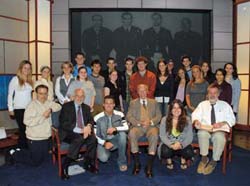|
January 2009
‘What I Saw...’ Richard C. Hottelet Reporting

Legendary journalist Richard C. Hottelet (front row, center) guest lectured in GW Vice President for Communications Michael Freedman's journalism class in 2007. CBS News Correspondent Sam Litzinger, who authored this article, appears in the front row at far right. The background photo includes Edward R. Murrow (second from left) and Hottelet (second from right) during World War II.
|
Gelman Library Receives Journalist’s Papers
By Sam Litzinger
The “descriptive summary” of the boxes at Gelman Library’s Special Collections Research Center gives a clue to their contents: “Richard C. Hottelet papers, 1944–1990 MS2228 12 Linear feet.” The summary could also read “an eyewitness account of some of the world’s most important events.”
During his 70-year career, journalist Richard C. Hottelet stood a few feet from Adolf Hitler, looking into his eyes, searching for a clue to the Fuehrer’s sometimes hypnotic power. He found none. He was imprisoned by the Gestapo for four months, accused of being a spy and threatened with the punishment usually meted out to espionage agents.
He was hired by Edward R. Murrow as a member of a group that would come to be known as “the Murrow Boys,” the CBS News reporters who invented broadcast journalism. He was on board a Ninth Air Force Marauder as it flew over the Normandy coast on D-Day and broadcast the first eyewitness account of the largest invasion in history.
Having never made a parachute jump before, he bailed out of a burning plane that was hit while on a bombing mission over Nazi Germany. He evaded German troops to report on the Battle of the Bulge.
Reporting from Moscow at the start of the Cold War, he was told by a top Soviet official that it was pointless for the West to hope for good relations with Joseph Stalin because the Russian leader was not the kind of man who made deals. Hottelet also reported on the creation of the United Nations, the Korean War, the conflicts in the Middle East, the space program, the war in Vietnam, the assassinations of John F. Kennedy, Robert F. Kennedy, and Martin Luther King Jr., and the Watergate scandal, among other stories.
Now his scripts, as well as many letters, cables, and telegrams, have found a home at GW, where Hottelet—91 and still a working journalist—has been a James Clark Welling Presidential Fellow and frequent lecturer in Vice President for Communications Michael Freedman’s radio news courses.
There are dispatches from his days as a philosophy student-turned-journalist in Hitler’s Germany through his work as a television and radio reporter and anchor at CBS to his op-ed and analysis pieces on recent events. They are a first-person account of what has been called “the first rough draft of history.” Throughout his long career, Hottelet has followed the journalistic principles espoused by his boss, Murrow: Be accurate, be fair, keep opinions out of the news story, and report on what you see or what you can discover to be true as best you can determine it.
An excerpt from Hottelet’s D-Day report is a case-in-point: Allied forces landed in France early this morning. I watched the first landing barges hit the beach exactly on the minute of H-Hour. I was in a Ninth Air Force Marauder flying at 4500 feet along 20 miles of the invasion coast. From what I could see during those first few minutes, there was nothing stopping the assault parties from getting ashore. We spent about half an hour over enemy territory. We flew over and bombed some of the coastal fortifications, but except for some light flak from inland positions and from some tanks firing at us, we saw no enemy gunfire. The only other sign of life in enemy territory was some white and yellow parachutes dotting the ground where our paratroopers had hit the ground. The weather is favorable for the operation.
Hottlet’s typewritten script on thin yellow paper has handwritten edits and a censor’s stamp. Holding it, you imagine what it must have been like to evade enemy fire while flying over the D-Day beaches, to rush back to England to turn notes into radio copy, to find Murrow waiting for you in the studio and then to go on the air to tell Americans that their troops had begun what General Dwight D. Eisenhower called “the great crusade.”
Despite years spent covering wars and international crises, Hottelet insists there was nothing particularly courageous about what he did. In his words, “You just take things the way they are. That’s your job.” As his papers show, Richard C. Hottelet has done his job extraordinarily well.
Sam Litzinger is a CBS News correspondent and host of “From the Nation’s Capital,” a one-hour, weekly program, produced by GW in partnership with Sirius-XM Satellite Radio.
Send feedback to: bygeorge@gwu.edu
|
|

|

